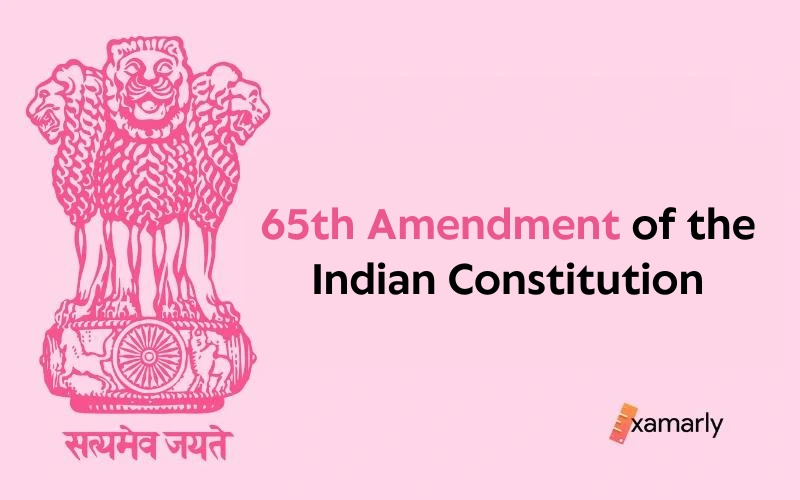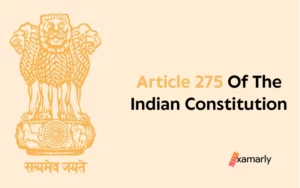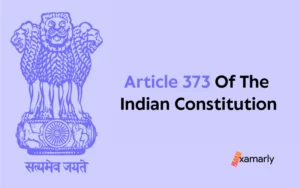Do you want to create relevant notes for the 65th Amendment of the Indian constitution for your UPSC preparation?
The Multi-member National Commission for Scheduled Castes and Scheduled Tribes was constituted by the 65th Amendment of the Indian constitution and the status of a special officer for Scheduled Castes and Scheduled Tribes was abolished.
As per the modification to Article 338 of the Constitution, a National Commission for Scheduled Tribes and Scheduled Castes was established.
It consists of a Chairperson, a Vice-Chairperson, and five additional members appointed by summons who will henceforth be in charge and have the authority of the Commission.
The Chairperson, Vice-Chairperson, and other Members so nominated shall be appointed for the periods and for the duration of time set forth by regulation of the President. All these people have to be chosen or elected by the President through a warrant bearing his signature and seal.
The Indian Constitution establishes the National Commission for Scheduled Castes and the National Commission for Scheduled Tribes as constitutional bodies.
As per Articles 338 and 338A, instead of being created by statute.
The National Commission for Minorities (1992) and the National Commission for the Protection of Child Rights (2007) are statutory bodies since they were created through legislative actions, unlike the National Commission for Scheduled Castes and the National Commission for Scheduled Tribes, which are constitutional bodies.
Let’s get into this article to know more about the 65th amendment of the Indian constitution for your UPSC exam preparation.
- Background Of the 65th Amendment Of the Indian Constitution
- Salient Features And Facts
- Date Enacted
- Statement Of Objects And Reasons
- Important Points to Remember
- Summing Up
- Frequently Asked Questions
- When was the 64th and 65th amendment of the Indian constitution Bills introduced?
- What is the role of the National Commission for Scheduled Castes?
- What is Article 338 of the Indian Constitution?
- Who appoints the Chairperson, Vice-Chairperson, and other members of the National Commission for Scheduled Castes and Scheduled Tribes?
- What are the authorities vested with the National Commission for Scheduled Castes and Scheduled Tribes?
- What is the tenure of office of the Chairperson, Vice-Chairperson, and other members of the National Commission for Scheduled Castes and Scheduled Tribes?
Background Of the 65th Amendment Of the Indian Constitution
- The multi-member National commission for scheduled castes and scheduled tribes was formed through an administrative resolution rather than a parliamentary act. Additionally, it was an unregistered organization.
- According to prevalent views, the establishment of competent high-level compliance with Article 338 is deemed more effective than appointing a single special commissioner in terms of ensuring legal protection for Scheduled Castes and Scheduled Tribes with the 65th amendment of the Indian constitution.
- In 1987, the government passed another executive decision that modified the operation of the 1978 executive resolution according to the 65th Amendment of the Indian constitution.
- They renamed it the National Commission for Scheduled Castes and Scheduled Tribes.
- Finally, the multi-member panel was created in 1978 through an executive order. The original Article 338 provision of a single officer was overturned in 1990 by the 65th Amendment of the Indian constitution.
Salient Features And Facts
- The Constitution’s Article 338 has now been changed to create a National Commission for Scheduled Castes and Tribes by the 65th Amendment of the Indian constitution.
- The Commission shall consist of a Chairperson, Vice-Chairperson, and five other Members. The conditions of service and tenure of the Chairperson, Vice-Chairperson, and other Members shall be determined by the President through rules, subject to the provisions of any law made by Parliament that is in the best interests of the country.
- The President is required to appoint the Chairperson, Vice-Chairperson, and other Members of the National Commission established under the 65th amendment of the Indian constitution by warrant duly signed by the President and sealed.
- A Special Officer for Scheduled Castes and Scheduled Tribes is established under Original Article 338 of the Constitution to look into any issues about the constitutional protections for SCs and STs. This special officer is also mandated to work for the SC’s and STs’ welfare.
Similar Posts:
- 40th Amendment of the Indian constitution
- 62nd Amendment of the Indian constitution
- 101st Amendment of the Indian constitution
Date Enacted
- The Constitution (Sixty-eighth Amendment) Bill popularly called the 65th Amendment of the Indian constitution came into effect in 1990.
- The provision given in Article 338 for a single officer and the executive resolution’s 1978 creation of a multi-member commission were both repealed by the 65th Amendment of the Indian Constitution. The 65th Amendment of the Indian Constitution made possible the establishment of a highly ranked multi-member National Commission for SC and STs.
Statement Of Objects And Reasons
- A Special Officer for the Scheduled Castes and Scheduled Tribes is designated in Article 338 of the Constitution with the responsibility of looking into any issues about the protections afforded to the Scheduled Castes and Scheduled Tribes by the Constitution and reporting to the President on their effectiveness.
- The protections provided by the constitution for Scheduled Castes and Scheduled Tribes are seen to be more effective under a top-ranked, five-member Commission as per article 338.
- It is also considered necessary to clarify the duties of the aforementioned Commission to include actions that must be taken by the Union or any State to ensure the successful execution of those protective measures and other actions for safeguarding, welfare, and socioeconomic advancement of the Scheduled Castes and Scheduled Tribes, as well as to delegate to the Commission other responsibilities related to such protection, welfare and socio-economic development.
- The recommendations of the aforementioned Commission are also believed to need to be presented to Parliament and the state legislatures.
See Also – 89th Amendment Of Indian Constitution
Important Points to Remember
The 65th Amendment of the Indian constitution will become effective on a date chosen by the Central Government and announced in the Official Gazette.
Amendment of Article 338 by 65th Amendment of the Indian Constitution
Article 338 of the Constitution is being amended, with the new title reading “National Commission for Scheduled Castes and Scheduled Tribes.”
Clauses (1) and (2) are being replaced, which establishes the National Commission for the Scheduled Castes and Scheduled Tribes by the 65th Amendment of the Indian constitution.
The Commission will be comprised of a Chairperson, Vice-Chairperson, and five other Members whose terms and conditions of service will be decided by the President through rules, subject to parliamentary law.
The President will appoint the members of the Commission. Itwill have the authority to regulate its procedures.
The duties of the Commission will be to investigate and monitor matters related to the safeguards provided for the Scheduled Castes and Scheduled Tribes under the Constitution, any other law, or any order of the Government, and to assess the effectiveness of these safeguards.
The Commission will also be responsible for examining specific complaints with respect to the deprivation of rights and protections of Scheduled Castes and Scheduled Tribes.
Additionally, the Commission will participate in and advise on the planning process of the socio-economic development of Scheduled Castes and Scheduled Tribes and will evaluate the progress of their development under the Union and any State.
The Commission will also present annual reports to the President on the effectiveness of the safeguards and make recommendations on measures to be taken by the Union or any State for their protection, welfare, and socio-economic development.
Role of President
The President may also specify additional functions for the Commission by rule, subject to parliamentary law according to the 65th Amendment of the Indian constitution.
The President is required to submit all reports from the Commission to both houses of Parliament, along with a memorandum explaining any action taken or proposed to be taken on the Union’s recommendations and the reasons for the non-acceptance of any recommendations.
If any part of the report concerns a matter with which any State Government is concerned, a copy of the report will be forwarded to the Governor of that State, who will then submit it to the State Legislature.
Along with a memorandum explaining any action taken or proposed to be taken on the State’s recommendations and the reasons for the non-acceptance of any recommendations.
Finally, this will have all the powers of a civil court when investigating or inquiring into any matter or complaint referred to in clauses (a) and (b) of clause (5), including summoning and enforcing the attendance of any person from any part of India.
Requiring the discovery and production of any document, receiving evidence on affidavits, requisitioning any public record or copy thereof from any court or office, issuing commissions for the examination of witnesses and documents, and any other matter which the President may specify by rule, subject to parliamentary law.
Summing Up
A high-level, multi-member National Commission for Scheduled Castes and Scheduled Tribes would be established by the 65th Constitutional Amendment of the Indian constitution instead of a single official for Scheduled Castes and Scheduled Tribes.
A National Commission for Scheduled Castes and Scheduled Tribes has been established under a modification to Article 338 of the Constitution.
It is composed of a Chairperson, a Vice-Chairperson, and five additional members who are appointed by summons and serve under the direction and control of the Chairperson.
The President must, by regulation, prescribe the terms of appointment and the term of office of the Chairperson, Vice-Chairperson, and any Members so nominated.
By warrant containing the President’s signature and seal, the Chairperson, Vice-Chairperson, and other members had to accept their appointments.
We have curated important points about the 65th Amendment of the Indian constitution exclusively for the UPSC exam preparation. Hope the blog helped you to create relevant notes for your preparation!
Frequently Asked Questions
When was the 64th and 65th amendment of the Indian constitution Bills introduced?
The 64th Amendment Bill (1989), which Rajiv Gandhi sponsored to bolster the PRIs, signalled the start of the amendment period. However, the Bill was not approved by the Rajya Sabha. In 1990, the 65th Amendment of the Indian constitution went into effect.
What is the role of the National Commission for Scheduled Castes?
It is for Scheduled Castes were established to look into, keep an eye on, and assess the effectiveness of any issues relevant to the safeguards given for the Scheduled Castes by this Constitution, any other law currently in effect, or under any government order.
What is Article 338 of the Indian Constitution?
Article 338 of the Constitution of India pertains to the establishment of the National Commission for Scheduled Castes and Scheduled Tribes. It outlines the duties and powers of the commission.
Who appoints the Chairperson, Vice-Chairperson, and other members of the National Commission for Scheduled Castes and Scheduled Tribes?
The President of India appoints the Chairperson, Vice-Chairperson, and other members of the National Commission for Scheduled Castes and Scheduled Tribes.
What are the authorities vested with the National Commission for Scheduled Castes and Scheduled Tribes?
The National Commission for Scheduled Castes and Scheduled Tribes has the power to regulate its own procedure and investigate and monitor matters relating to the safeguards provided for the Scheduled Castes and Scheduled Tribes.
It can also make recommendations for the effective implementation of those safeguards and discharge other functions in relation to the protection, welfare, and development of the Scheduled Castes and Scheduled Tribes.
What is the tenure of office of the Chairperson, Vice-Chairperson, and other members of the National Commission for Scheduled Castes and Scheduled Tribes?
The tenure of office of the Chairperson, Vice-Chairperson, and other members of the National Commission for Scheduled Castes and Scheduled Tribes is determined by the President of India through rules, subject to the provisions of any law made by Parliament.






